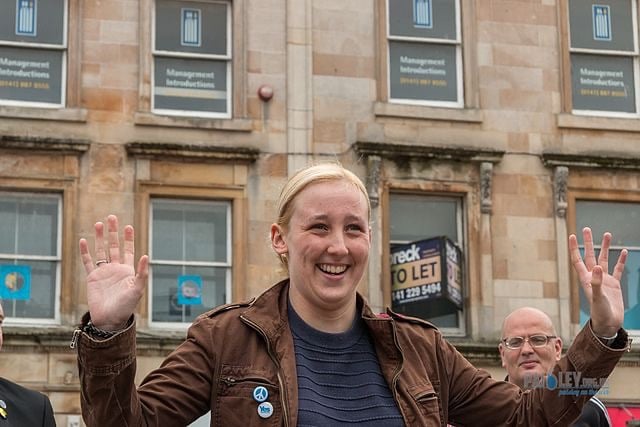Mhairi Black, the former SNP deputy leader at Westminster and once Britain’s youngest MP, has quit the party with a scathing attack on its stance on transgender rights and Palestine. The 30-year-old confirmed she had ended her membership in recent weeks, citing fundamental disagreements with the party’s direction under current leadership.
In an exclusive interview with The Herald, Ms Black expressed frustration at what she called the SNP’s “capitulation on LGBT rights, trans rights in particular,” and criticised the party’s approach to the conflict in Gaza. Her departure represents a significant blow to First Minister John Swinney, who is already facing internal discord over independence strategy and a recent by-election defeat.
“Basically, for a long time, I’ve not agreed with quite a few decisions that have been made,” Ms Black told the newspaper. “There have just been too many times when I’ve thought, ‘I don’t agree with what you’ve done there’, or a decision or strategy that has been arrived at.”
From Rising Star to Disillusioned Departure
Ms Black’s political journey began spectacularly in 2015 when, aged just 20 years and 237 days, she defeated Labour heavyweight Douglas Alexander to become MP for Paisley and Renfrewshire South. Her election made her the youngest MP since 1832, and she had to complete her university exams after being elected to Westminster.
She quickly became a prominent figure in the SNP’s Westminster group, known for her passionate speeches and strong advocacy for independence. Her maiden speech in July 2015 went viral, establishing her as a rising star within the nationalist movement.
Ms Black was re-elected in 2017 and 2019, increasing her majority to over 10,000 votes. In December 2022, she was appointed Deputy Leader of the SNP at Westminster, cementing her position within the party hierarchy.
Trans Rights at Heart of Split
The former MP has been a vocal supporter of transgender rights throughout her career. She strongly backed Nicola Sturgeon’s Gender Recognition Reform Bill, which aimed to introduce a system of self-declaration for obtaining a gender recognition certificate and remove the need for a medical diagnosis of gender dysphoria.
In 2023, Ms Black faced criticism for comparing gender-critical campaigners to white supremacists and suggesting they were funded by “fundamental Christian groups in America.” She argued that opponents who made “intellectual” arguments against extending trans rights were similar to past generations who claimed non-white ethnic groups were inferior.
The Scottish Government’s gender reform legislation was eventually blocked by the UK Government using Section 35 powers in January 2023, marking the first time Westminster had prevented a Scottish bill from becoming law. The controversy contributed to Ms Sturgeon’s resignation as First Minister just weeks later.
Palestine Stance Also Criticised
Ms Black also cited the SNP’s position on Palestine as a factor in her decision to leave. She has previously pressured UK ministers over what she termed “war crimes” being committed by Israel in Gaza and believed the party could have taken a stronger stance on the issue.
Her comments come as John Swinney faces demands from within the SNP to confront Donald Trump over “genocide and ethnic cleansing” in Gaza during the US President’s upcoming visit to Scotland this weekend.
Party Shift Allegation
Despite maintaining her support for Scottish independence, Ms Black suggested the party had moved away from her political values rather than the other way around. “If anything, I’m probably a bit more left-wing than I have been. I don’t think I have changed all that much. I feel like the party needs to change a lot more,” she stated.
The former MP had previously criticised what she called a “cult of personality” around Nicola Sturgeon, saying it made her “uncomfortable” and that politics should be “about policy as opposed to personality.
Political Impact
Ms Black’s departure adds to mounting pressure on John Swinney’s leadership. The First Minister is already dealing with internal criticism over the lack of a clear independence strategy and the SNP’s defeat in the Hamilton, Larkhall and Stonehouse by-election, where they were favourites to win.
The timing of her announcement is notable, coming just a month before she is scheduled to perform a new show at the Edinburgh Fringe Festival. She stood down as an MP before the 2024 general election, citing Westminster as “one of the most unhealthy workplaces you could ever be in” and describing it as a “toxic environment.
During her time as an MP, Ms Black faced criticism for her attendance record and was diagnosed with ADHD, which she said contributed to periods of absence from the House of Commons.
SNP Response
An SNP spokesperson responded to Ms Black’s departure by emphasising party unity: “The SNP is the largest political party in Scotland, united under John Swinney’s vision of creating a better, fairer Scotland for everyone.
The spokesperson added: “After a year of disappointment and let-downs from the UK Labour Government, it’s clear that real change will never come from Westminster and that independence is essential for a better future.
Ms Black’s exit from the SNP represents the loss of one of its most recognisable younger figures, once tipped by some as a future First Minister. Her departure over trans rights and Palestine highlights continuing divisions within the party on these contentious issues.
The Scottish Government has since dropped its proposed gender recognition reforms, with current First Minister John Swinney confirming they would not be revived. This retreat from the legislation that Ms Black championed appears to have been the final straw in her relationship with the party she joined as a teenager.
Follow for more updates on Britannia Daily
Image Credit:
Mhairi Black, 16 July 2016 – Image by Katie Chan, licensed under CC BY-SA 4.0, via Wikimedia Commons.



